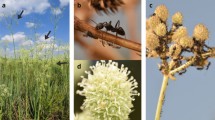Abstract
Reciprocal specialization in interspecific interactions, such as plant-pollinator mutualisms, increases the probability that either party can have detrimental effects on the other without the interaction being dissolved. This should be particularly apparent in obligate mutualisms, such as those that exist between yucca and yucca moths. Female moths collect pollen from yucca flowers, oviposit into floral ovaries, and then pollinate those flowers. Yucca moths, which are the sole pollinators of yuccas, impose a cost in the form of seed consumption by the moth larvae. Here we ask whether there also is a genetic cost through selfish moth behavior that may lead to high levels of self fertilization in the yuccas. Historically, it has been assumed that females leave a plant immediately after collecting pollen, but few data are available. Observations of a member of the Tegeticula yuccasella complex on Yucca filamentosa revealed that females remained on the plant and oviposited in 66% of all instances after observed pollen collections, and 51% of all moths were observed to pollinate the same plant as well. Manual cross and self pollinations showed equal development and retention of fruits. Subsequent trials to assess inbreeding depression by measuring seed weight, germination date, growth rate, and plant mass at 5 months revealed significant negative effects on seed weight and germination frequency in selfed progeny arrays. Cumulative inbreeding depression was 0.475, i.e., fitness of selfed seeds was expected to be less than half that of outcrossed seeds. Single and multilocus estimates of outcrossing rates based on allozyme analyses of open-pollinated progeny arrays did not differ from 1.0. The discrepancy between high levels of behavioral self-pollination by the moths and nearly complete outcrossing in mature seeds can be explained through selective foreign pollen use by the females, or, more likely, pollen competition or selective abortion of self-pollinated flowers during early stages of fruit development. Thus, whenever the proportion of pollinated flowers exceeds the proportion that can be matured to ripe fruit based on resource availability, the potential detrimental genetic effects imposed through geitonogamous pollinations can be avoided in the plants. Because self-pollinated flowers have a lower probability of retention, selection should act on female moths to move among plants whenever moth density is high enough to trigger abortion.
Similar content being viewed by others
Author information
Authors and Affiliations
Additional information
Received: 18 March 1996 \Accepted: 30 July 1996
Rights and permissions
About this article
Cite this article
Pellmyr, O., Massey, L., Hamrick, J. et al. Genetic consequences of specialization: yucca moth behavior and self-pollination in yuccas. Oecologia 109, 273–278 (1997). https://doi.org/10.1007/s004420050083
Issue Date:
DOI: https://doi.org/10.1007/s004420050083




